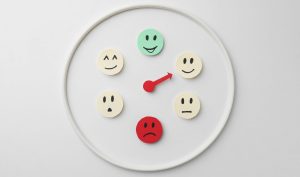Cancer diagnosis and treatment can be incredibly stressful, causing significant emotional distress for many patients. While we often hear about this connection, it can be difficult to recognise the signs in ourselves or our loved ones.
In recognition of Stress Awareness Month this April, let’s explore some frequently asked questions about distress in cancer patients.
“Why do I no longer feel like myself after my cancer diagnosis?”
“Why do I feel more stressed compared to other cancer patients?”
“What are some practical strategies for cancer patients to manage emotional distress?”

Why do I no longer feel like myself after my cancer diagnosis?
Understanding Disconnection from the Self: Potential Causes
- Hormones: Cancer and some medications can affect your hormones, impacting your mood and stress response.
- Stress: Coping with cancer can be overwhelming, causing you to feel distant from your usual self.
- Major life changes: Cancer can shift your focus to medical issues and practical concerns, taking away from your usual personal psychological needs and wants.
- Loss: The cancer journey may involve various losses, like loss of function, identity, or social roles. Grieving these losses can cause a sense of detachment.
- Changes in relationships: Talking about cancer with loved ones might lead you to downplay your own needs to comfort them, causing a disconnect from yourself.
Notice that having the above stressors in our daily lives does not automatically elicit stress reactions. Let us explore what facilitates the development of distress in cancer patients.
Why do I feel more stressed compared to other cancer patients?
Understanding Stress Variations in Cancer Patients
Cancer patients experience stress differently, even with similar challenges. This variation can be attributed to unique cancer journeys, life situations, and individual perceptions of stress. Here are some common thinking patterns that can be unhelpful for cancer patients:
- Overthinking: Magnifying the negative (e.g., a non-terminal cancer patient might feel overwhelmed and think, “Treatment will not help anyway”)
- All-or-nothing mentality: Polarised thinking and the inability to consider a spectrum of possibilities (e.g., a cancer patient might have the thought, “A relapse equals the end and there is no point in living”).
- Jumping to a conclusion: Jumping to negative conclusions about the future (e.g., “A cancer diagnosis might lead someone to believe they will never recover”)
Learning to identify and challenge these negative thought patterns is a crucial step for cancer patients to improve their emotional well-being and manage stress.

Coping Mechanisms for Cancer Patients: Techniques to Manage Stress
The 3Cs method can help you challenge negative thoughts about stress and boost your stress-coping skills.
- Catch: Notice when you are having negative thoughts
- Check: Determine if the thought is factual and realistic
- Change: Develop a more positive and helpful way of thinking
Dealing with certain life events, such as cancer, can be challenging. In such situations, you may need someone to journey with you.

Getting Support
Dealing with cancer can be tough, and you do not have to go through it alone. Therefore, consider seeking professional help from a counsellor to manage stress and overcome challenges. Our Counsellors are here to assist you on your journey, feel free to reach out if you require help.






